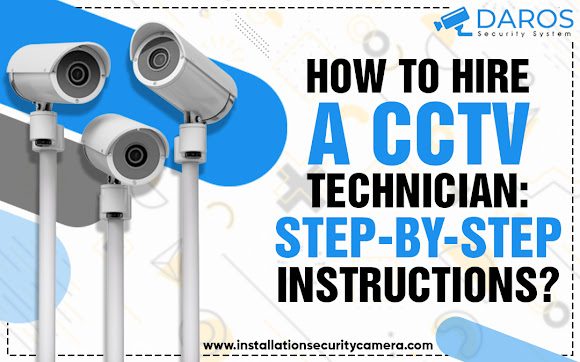Ultimate Guide to Security Camera & CCTV Installation for Maximum Safety
In a time when safety and monitoring are paramount,
both homes and businesses need to have security cameras installed. An
adequately set up CCTV system stops criminals from doing bad things and
provides essential proof in case of an accident. Installing the right
surveillance system is a game-changer whether you want to keep an eye on your
property from afar or make your job safer. But where do you begin? This article will show you the most essential
steps for setting up security cameras so that you can make the best decisions
for your safety.
Picking Out the Best Security Cameras
Getting the right kind of security cameras is the
first thing to be done when installing CCTV.
The choices are vast, from wired to wireless options, indoor to outdoor
cameras, and essential to high-tech models with night vision and motion
recognition. Dome cameras are brilliant for covert monitoring. Conversely,
bullet cameras stand out and can be used to prevent access by individuals. If
you know exactly what you need—that is, the size of the service area, the
quality, and the storage capacity—you will be in good shape.
Understanding CCTV Installation Requirements
Before installing security cameras, it's essential to
consider the technology needs. Power source, internet access, and data storage
are all very important for ensuring everything works well. Moving around wired
setups is simpler but be sure the cables are connected correctly to prevent
dark areas. The Wi-Fi connectivity must be steady if wireless configurations
are to operate. Installation problems can be avoided if these needs are planned
for and evaluated correctly.
Proper Placement for Maximum Coverage
To monitor events, security cameras should be
positioned in the correct locations. Entrants, highways, stairs, and blind
areas are among the most crucial areas to be on lookout for. Cameras placed close to cash registers,
storage areas, and customer waiting stations help businesses to be safer. Outdoor cameras should also be set up at a
height that makes it impossible to mess with them while still getting a good
view. Avoid putting cameras against
direct sunlight or reflective surfaces, which may impact video quality.
Professional vs. DIY Security Camera Installation
Many businesses and homeowners choose to install their
own CCTV, but getting a professional can save you time and ensure the job is
done correctly. Professionals know the best positions, wiring methods, and
system setups to get the most protection coverage. If you know how to do it,
adding a wireless system might be a better deal. To do your installations, you
need to follow the manufacturer's instructions, ensure network connections are
safe, and set up online access features correctly.
Maintenance and Monitoring of CCTV Systems
For your security camera system to keep working, it
must be serviced regularly. It is essential to clean the lenses, check the
wiring, update the firmware, and ensure enough storage space. Adding mobile
apps to CCTV systems also makes it possible to monitor in real-time from
anywhere. Today's security cameras come with cloud storage, AI-powered alerts,
and motion recognition, all of which make you safer and give you peace of mind.
Conclusion
Installing CCTV is one of the finest ways to keep your
company and family secure. Whether you go with a basic residential arrangement,
or a complete corporate security system makes no difference. It will work as best as it could if one plans
and installs it properly. Important aspects of monitoring are selecting
appropriate cameras, positioning them, and maintaining their shape by means of
their maintenance. Making the correct decisions will provide you better
location to live, more safety, and mental peace of mind. Secure your world with
Installation Security Camera – expert CCTV installation you trust.
.jpg)



Comments
Post a Comment